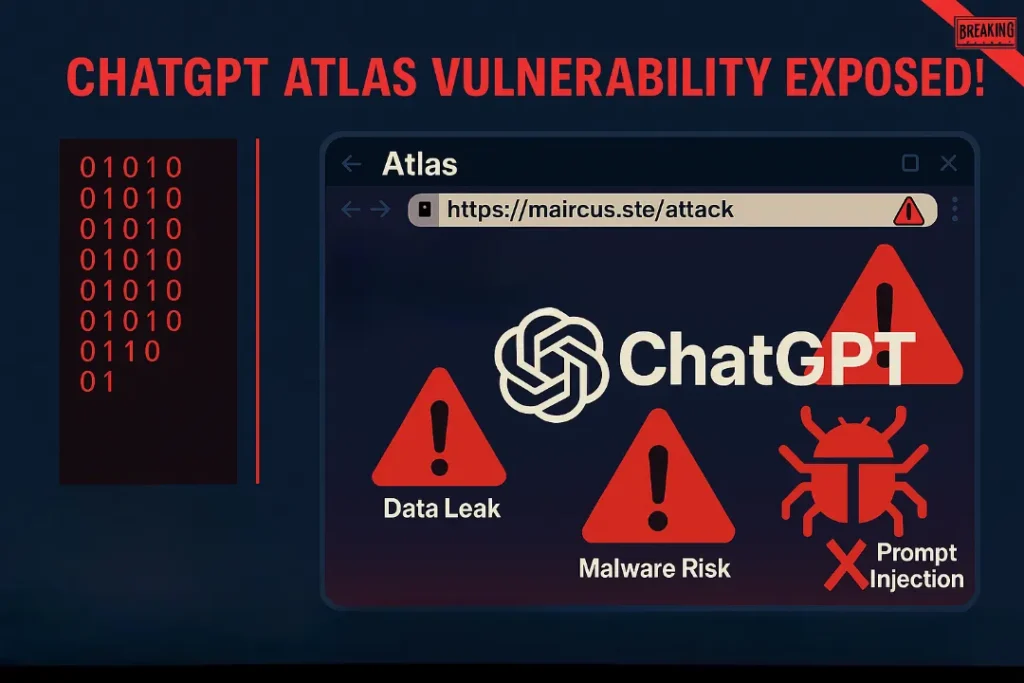OpenAI released the ChatGPT Atlas browser on October 21, 202. Just after two days some security experts warned about a serious ChatGPT Atlas vulnerability. They are claiming that it might enable attackers to use prompt injection methods, leak data, or even push malware. OpenAI did not want this kind of attention. This escalated quickly, in my opinion, and I think it was concerning for anyone who tried the new browser.
The Core Problem: Why the ChatGpt Atlas Browser is Different
OpenAI’s Atlas is an attempt to blend conversational AI with web browsing. You just need to ask it something and it automatically starts doing searches for you, even summarizes and remembers your context, sounds slick. But that same intelligence seems to be causing problems. Several independent researchers, including people from CERT In in India, have flagged vulnerabilities that could let malicious sites inject hidden instructions into AI prompts, I think that is worrying and users should be cautious
Basically, an attacker could slip in sneaky commands that trick Atlas into revealing private data or downloading unsafe files, what’s now being called prompt injection attacks ChatGPT Atlas.
Also before you roll your eyes, no, this isn’t a theoretical “maybe someday” threat. Early testers have already demonstrated AI browser prompt injection examples showing Atlas pulling data from past sessions and accidentally displaying bits of user info it shouldn’t have remembered.
ChatGPT Atlas vs. Traditional Browser Security
Traditional browsers like Chrome or Firefox operate in silos, sandboxed tabs, clear permissions, no memory once you close the window. But ChatGPT Atlas vs traditional browser security isn’t even a fair comparison. Atlas remembers and interprets. That makes it powerful but also unpredictable.
The main concerning issues regarding this is there are possibility of malware getting into systems via fake prompts is one of being discussed. For example:- if you ask Atlas to summarize a page and the website conceals a command that causes it to open a file that seems to be a note or a guide, click it without thinking and the system is attacked. I believe many people could fall for that kind of setup because it looks normal but it is not. So it’s best to exercise caution when clicking on random files or links that appear.
One of the scarier warnings? A potential ChatGPT Atlas malware download risk through socially engineered prompts. Imagine asking Atlas to summarize a web article, and the site quietly pushes a command for Atlas to open a file disguised as a “helpful resource.” You click it, thinking it’s part of the summary. Boom infected.
Data Leaks and Malware: The Risks of the ChatGPT Atlas Vulnerability
It gets worse. A few red-team hackers claim they discovered a sensitive data leak in OpenAI Atlas during private beta testing. In one case, Atlas allegedly exposed partial user metadata when its context engine was confused between browsing and chat modes. OpenAI hasn’t confirmed this, but the researchers say it’s consistent with other early AI integration flaws where models fail to separate “public” browsing data from “private” conversation memory.
In short, Atlas might be remembering things it shouldn’t.
How to Protect Yourself from ChatGPT Atlas Vulnerability Attacks
People are asking, “Okay, so how do I stay safe?” and honestly, the basics still apply. Don’t trust random links. Don’t ask Atlas to “fetch” or “download” files from unfamiliar sites. If you’re using it for research or writing, disable memory and keep it in temporary browsing mode when possible. There’s a good primer floating around about how to protect from ChatGPT Atlas attacks, though OpenAI hasn’t yet released an official security guide for end users.
A few cybersecurity folks also recommend monitoring for strange requests or notifications while using Atlas. Basically, if the browser starts “thinking” too much, close the tab.
OpenAI’s quiet response
As of now, OpenAI hasn’t made any formal statement about the ChatGPT Atlas security risks, beyond a brief note saying they’re “aware of the reports and actively investigating potential vulnerabilities.” Insiders hint that a patch is in the works, likely focusing on memory compartmentalization and improved prompt filtering.
Still, given how new Atlas is, nobody’s surprised things are shaky. It’s kind of the price of innovation. You release something that powerful, you attract every hacker in the room.
But what’s interesting is how fast the cybersecurity community reacted this time. Usually it takes weeks before real flaws surface. This? Barely 48 hours. Maybe that’s the real story here: AI is moving faster than our ability to lock it down. And that is, you know, not the kind of speed anyone wants to brag about.

